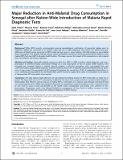| dc.contributor.author | Thiam, Sylla | |
| dc.contributor.author | Thior, Moussa | |
| dc.contributor.author | Faye, Babacar | |
| dc.contributor.author | Ndiop, Me´doune | |
| dc.contributor.author | Diouf, Mamadou Lamine | |
| dc.contributor.author | Diouf, Mame Birame | |
| dc.contributor.author | Diallo, Ibrahima | |
| dc.contributor.author | Fall, Fatou Ba | |
| dc.contributor.author | Ndiaye, Jean Louis | |
| dc.contributor.author | Albertini, Audrey | |
| dc.contributor.author | Lee, Evan | |
| dc.contributor.author | Jorgensen, Pernille | |
| dc.contributor.author | Gaye, Oumar | |
| dc.contributor.author | Bell, David | |
| dc.date.accessioned | 2021-09-01T09:28:46Z | |
| dc.date.available | 2021-09-01T09:28:46Z | |
| dc.date.issued | 4/6/2011 | |
| dc.identifier.citation | Thiam S, Thior M, Faye B, Ndiop M, Diouf ML, et al. (2011) Major Reduction in Anti-Malarial Drug Consumption in Senegal after Nation-Wide Introduction of Malaria Rapid Diagnostic Tests. PLoS ONE 6(4): e18419. doi:10.1371/journal.pone.0018419 | en_US |
| dc.identifier.other | PMID: 21494674 | |
| dc.identifier.uri | http://repository.amref.org/handle/123456789/199 | |
| dc.description | @ 2011 Thiam et al. This is an open-access article distributed under the terms of the Creative Commons Attribution License, which permits
unrestricted use, distribution, and reproduction in any medium, provided the original author and source are credited | en_US |
| dc.description.abstract | Background: While WHO recently recommended universal parasitological confirmation of suspected malaria prior to
treatment, debate has continued as to whether wide-scale use of rapid diagnostic tests (RDTs) can achieve this goal.
Adherence of health service personnel to RDT results has been poor in some settings, with little impact on anti-malarial
drug consumption. The Senegal national malaria control programme introduced universal parasite-based diagnosis using
malaria RDTs from late 2007 in all public health facilities. This paper assesses the impact of this programme on anti-malarial
drug consumption and disease reporting.
Methods and Findings: Nationally-collated programme data from 2007 to 2009 including malaria diagnostic outcomes,
prescription of artemisinin-based combination therapy (ACT) and consumption of RDTs in public health facilities, were
reviewed and compared. Against a marked seasonal variation in all-cause out-patient visits, non-malarial fever and
confirmed malaria, parasite-based diagnosis increased nationally from 3.9% of reported malaria-like febrile illness to 86.0%
over a 3 year period. The prescription of ACT dropped throughout this period from 72.9% of malaria-like febrile illness to
31.5%, reaching close equivalence to confirmed malaria (29.9% of 584873 suspect fever cases). An estimated 516576 courses
of inappropriate ACT prescription were averted.
Conclusions: The data indicate high adherence of anti-malarial prescribing practice to RDT results after an initial run-in
period. The large reduction in ACT consumption enabled by the move from symptom-based to parasite-based diagnosis
demonstrates that effective roll-out and use of malaria RDTs is achievable on a national scale through well planned and
structured implementation. While more detailed information on management of parasite-negative cases is required at point
of care level to assess overall cost-benefits to the health sector, considerable cost-savings were achieved in ACT
procurement. Programmes need to be allowed flexibility in management of these funds to address increases in other
programmatic costs that may accrue from improved diagnosis of febrile disease. | en_US |
| dc.description.sponsorship | Senegal Programme National de lutte contre le Paludisme from the Global Fund to fight
AIDS, Tuberculosis and Malaria and the United States Presidents’ Malaria Initiative, and by the Foundation for Innovative New Diagnostics (FIND) through a grant
from the Bill and Melinda Gates Foundation. | en_US |
| dc.language.iso | en | en_US |
| dc.publisher | PLoS ONE | en_US |
| dc.subject | Rapid diagnostic tests (RDTs) | en_US |
| dc.subject | Senegal | en_US |
| dc.subject | Public health | en_US |
| dc.subject | Artemisinin-based combination therapy (ACT) | en_US |
| dc.subject | Fever | en_US |
| dc.title | Major Reduction in Anti-Malarial Drug Consumption in Senegal after Nation-Wide Introduction of Malaria Rapid Diagnostic Tests | en_US |
| dc.type | Article, Journal | en_US |

